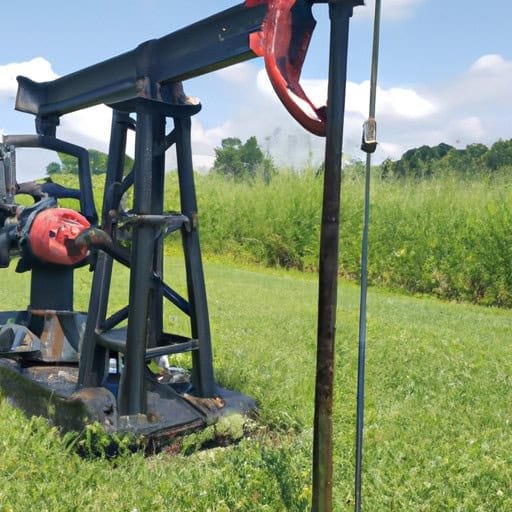Are you considering expanding or upgrading your well water system? If so, it’s important to understand the maintenance considerations involved. By addressing these considerations, you can ensure that your well water system operates efficiently and effectively, providing you with a reliable source of clean and safe water. From routine inspection and testing to monitoring water levels and equipment performance, taking the proper maintenance steps will help to prolong the lifespan of your well water system and avoid any costly repairs down the line.

Types of Well Water System Expansion and Upgrades
Expanding Well Capacity
Expanding the well capacity involves increasing the amount of water that the well can produce. This can be done through various methods, such as drilling a new well or deepening an existing one. Expanding the well capacity is essential when the demand for water exceeds the current well’s capabilities.
Adding Treatment Components
Adding treatment components to a well water system includes installing equipment such as filtration systems, disinfection units, or water softeners. This upgrade is necessary to ensure that the water being pumped from the well is safe and meets the required quality standards.
Improving Pumping Efficiency
Improving pumping efficiency involves optimizing the performance of the well pump. This can be achieved by upgrading the pump or making adjustments to the existing system. By improving pumping efficiency, less energy is consumed, and the overall water supply is more reliable.
Assessing the Need for Expansion or Upgrades
Evaluating Water Demand
To determine the need for expansion or upgrades, it is crucial to evaluate the water demand. Consider factors such as the number of users, daily water consumption, and any potential increase in demand over time. This assessment will provide valuable insights into whether the current well water system can meet the demand adequately.
Checking Water Quality
Checking the water quality is another essential consideration. Conducting regular water testing will help identify any contaminants or impurities present in the water. If the tests indicate poor water quality, adding treatment components or upgrading the existing ones becomes necessary.
Determining Pump Performance
Assessing the pump performance involves evaluating how efficiently the pump can deliver water from the well. Factors such as the pump’s output, pressure levels, and any signs of reduced performance should be monitored. If the pump is not performing optimally, it may need to be repaired or replaced.
Budgeting for Well Water System Expansion and Upgrades
Cost of Equipment and Materials
Determine the costs associated with the required equipment and materials for the expansion or upgrades. This includes the price of well pumps, treatment components, pipes, valves, and any other necessary items for the project. It is important to research different suppliers and compare prices to ensure the best value for money.
Labor and Installation Costs
Labor and installation costs should also be factored into the budget. Depending on the complexity of the project, professional expertise might be required for drilling, installing treatment equipment, or adjusting the pump system. Obtaining quotes from contractors will help estimate the expenses accurately.
Factors Affecting Budget Allocation
Consider various factors that could affect the budget allocation for well water system expansion and upgrades. Factors such as the location of the well, accessibility, soil conditions, and any specific requirements or challenges should be taken into account. These factors may influence the overall cost of the project.
Evaluating Potential Impact and Benefits
Increased Water Availability
Expanding the well capacity or improving pumping efficiency will likely result in increased water availability. This means that more water will be accessible for usage, meeting the demands of a growing population or increasing water needs. Increased water availability can ensure a consistent supply for both residential and commercial purposes.
Improved Water Quality
By adding treatment components or upgrading existing ones, the water quality can be significantly improved. Filtration systems can remove impurities, disinfection units can eliminate harmful bacteria, and water softeners can reduce the presence of minerals. Improved water quality ensures safe and clean water for drinking, cooking, and other everyday activities.
Reduced Energy Consumption
Improving pumping efficiency directly correlates with reduced energy consumption. By upgrading the pump or optimizing the pump system, less energy is required to pump water from the well. This not only benefits the environment by reducing carbon emissions but also leads to cost savings in energy bills.

Complying with Regulatory Requirements
Permits and Approvals
Before conducting any well water system expansion or upgrades, it is important to check for necessary permits and approvals. Local authorities or regulatory bodies may require specific documentation to ensure that the project meets safety and environmental standards. Obtain the required permits and approvals to comply with the regulations.
Water Testing and Monitoring
Regular water testing and monitoring are essential to comply with regulatory requirements. Ensure that the water quality meets the standards set by the relevant authorities. Regularly monitor the water quality to identify any changes or issues that may require immediate attention.
Environmental Considerations
Consider the environmental impact of the expansion or upgrades. Evaluate the potential effects on the surrounding ecosystems, groundwater, and any protected areas. Implement proper measures to minimize environmental harm, such as responsible waste disposal and preventing contamination of nearby water sources.
Choosing the Right Contractor
Checking Licenses and Certifications
When selecting a contractor for well water system expansion or upgrades, it is crucial to check their licenses and certifications. Ensure that they have the necessary qualifications and experience in carrying out similar projects. Licensed contractors are more likely to adhere to industry standards and regulations.
Reviewing Previous Projects
Reviewing the contractor’s previous projects can provide insight into their work quality and capabilities. Request references or testimonials from past clients to gauge their level of satisfaction. This will help you assess whether the contractor is the right fit for your specific project requirements.
Obtaining Multiple Quotes
Obtaining multiple quotes from different contractors is essential for budgeting purposes and getting the best possible service. Compare the prices, project timelines, and services offered by each contractor. Ensure that the quotes include all the necessary details, such as equipment costs, labor, and potential additional expenses.

Implementing Expansion and Upgrade Projects
Project Planning and Timeline
To implement well water system expansion or upgrades successfully, thorough project planning is necessary. Define the project objectives, create a timeline, and allocate resources accordingly. Involve all relevant stakeholders in the planning process to ensure a smooth and efficient execution.
Ensuring Safety Measures
Prioritize safety throughout the implementation process. Follow recommended safety protocols and guidelines to prevent accidents or injuries. Ensure that all contractors and workers are aware of and trained in safety measures specific to well water system projects.
Coordinating with Contractors
Maintain effective communication and coordination with the contractors involved in the project. Regularly update them on project progress and any changes or challenges that may arise. Address any concerns promptly to ensure that the expansion or upgrades meet the desired outcomes.
Performing Routine Maintenance
Inspecting and Cleaning Wells
Perform regular inspections of the well to identify any signs of damage or deterioration. Clean the well periodically to remove any sediment or debris that may affect water quality or well performance. Regular maintenance will help prolong the lifespan of the well and ensure its optimal functioning.
Monitoring Water Quality
Continuously monitor the water quality to ensure that it meets the desired standards. Conduct routine water tests and promptly address any issues that may arise. Regular monitoring will help identify potential problems before they escalate and ensure the well water system’s longevity.
Maintaining Treatment Components
Regularly maintain the treatment components, such as filtration systems or disinfection units. Follow the manufacturer’s recommendations for cleaning, replacing filters, or servicing the equipment. Proper maintenance will ensure that the treatment components function effectively and deliver the desired water quality.
Addressing Unforeseen Issues
Dealing with Water Contamination
In the event of water contamination, take immediate action to identify the source and resolve the issue. Conduct thorough water testing to determine the contaminants present and implement appropriate treatment measures. It is crucial to address water contamination promptly to safeguard the health and well-being of users.
Repairing Pump Failures
If a pump failure occurs, the water supply will be disrupted. Promptly assess the cause of the failure and determine whether a repair or replacement is necessary. Work with a qualified professional to resolve pump failures efficiently and effectively to minimize downtime.
Resolving System Malfunctions
System malfunctions can occur due to various reasons, such as electrical failures or plumbing issues. When faced with system malfunctions, consult with experts to diagnose the problem accurately and implement the necessary repairs. Regular maintenance and monitoring can help prevent system malfunctions, but occasional issues may still arise.
Educating and Engaging Users
Promoting Water Conservation
Educate users about the importance of water conservation and responsible water usage. Provide information on simple techniques to reduce water consumption, such as fixing leaks, using efficient appliances, or practicing shorter showers. Engaging users in water conservation efforts helps preserve the water supply and minimize strain on the well water system.
Providing User Manuals
Provide comprehensive user manuals for the well water system, including any added treatment components or upgraded equipment. The manuals should contain instructions on operating the system, maintenance procedures, troubleshooting tips, and emergency contacts. User manuals help users understand and maintain the system effectively.
Offering Training Programs
Offer training programs to users or well system operators to ensure they are knowledgeable about the system and its components. Training sessions can cover topics such as system operation, maintenance routines, and basic troubleshooting. Equipping users with the necessary knowledge enhances the overall performance and longevity of the well water system.
In conclusion, well water system expansion and upgrades require careful consideration and planning. Assessing the need for expansion or upgrades, budgeting appropriately, and evaluating the potential impact and benefits are vital steps in the process. Compliance with regulatory requirements, choosing the right contractor, and implementing the projects efficiently is crucial for successful outcomes. Routine maintenance, addressing unforeseen issues, and educating users are essential for ensuring the longevity and optimal performance of the well water system. By following these considerations and taking appropriate actions, users can enhance their well water system to meet their growing needs and maintain a reliable and safe water supply.

